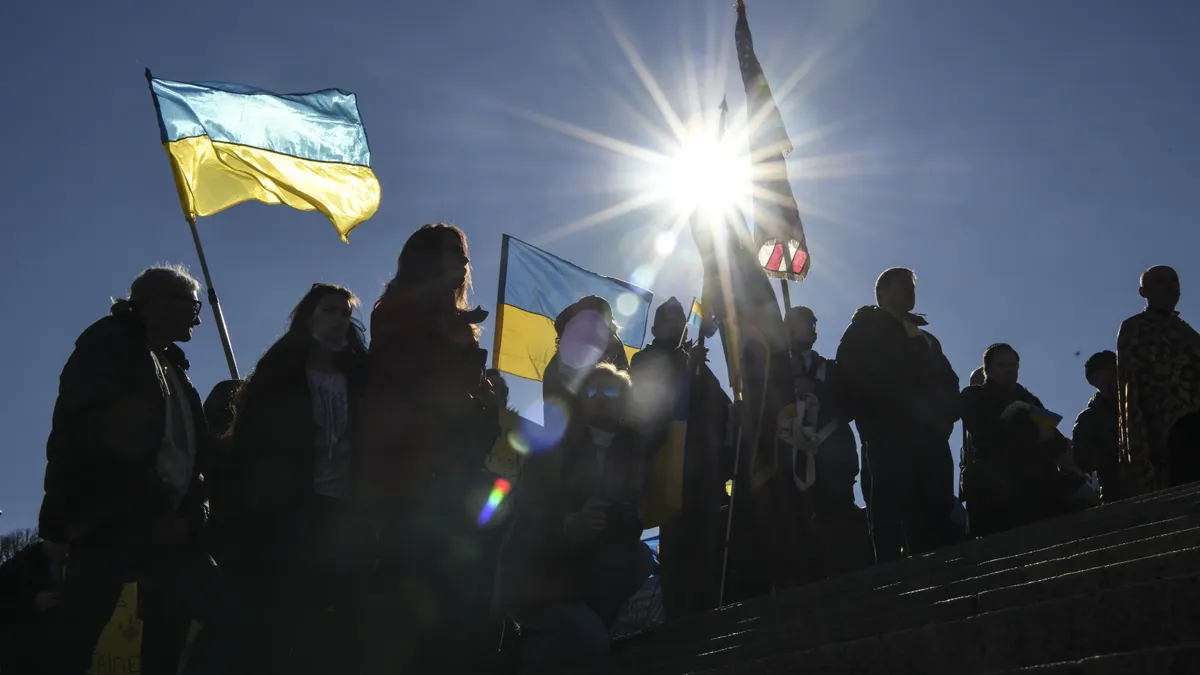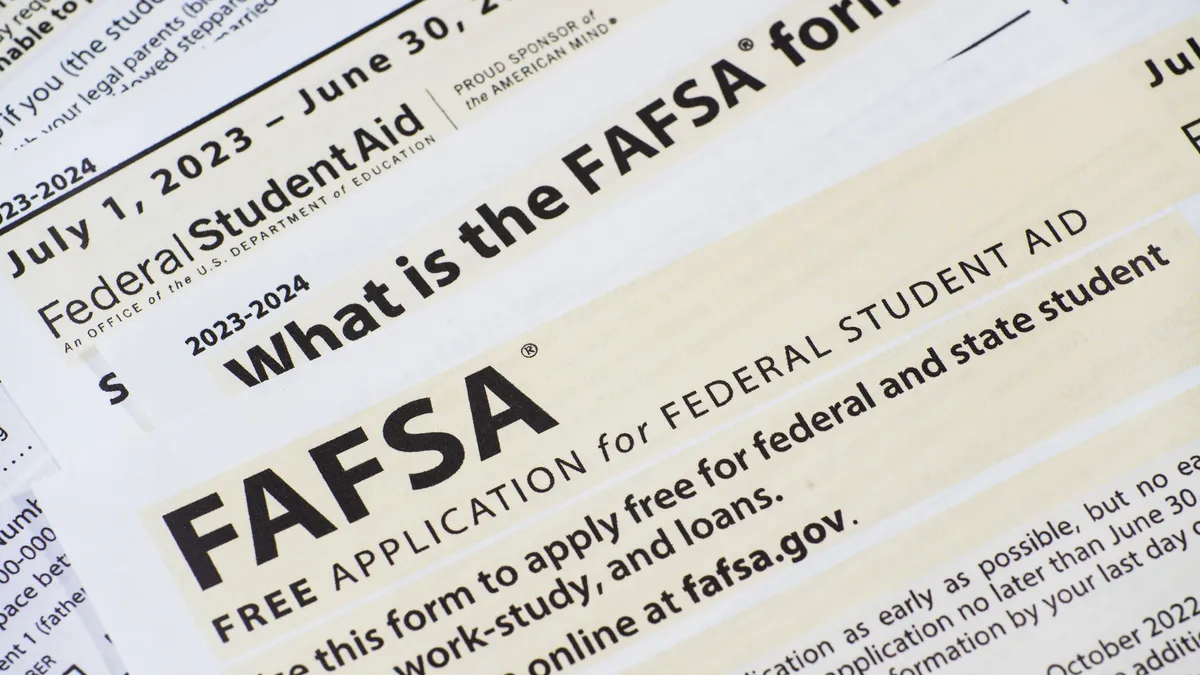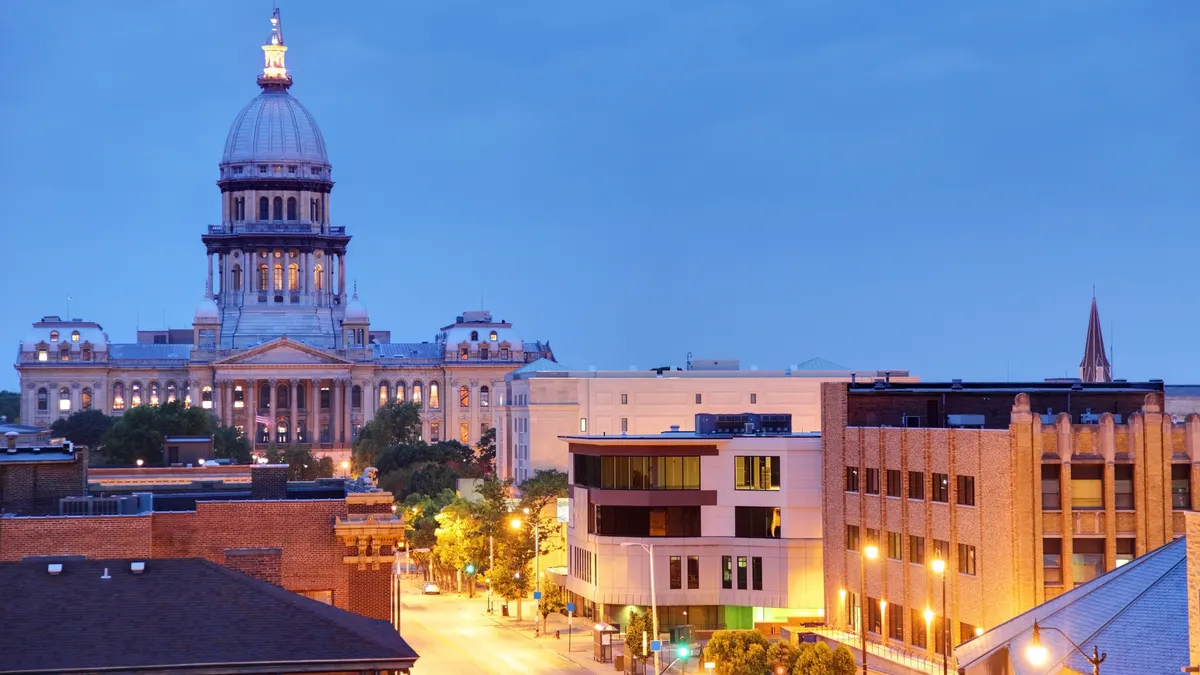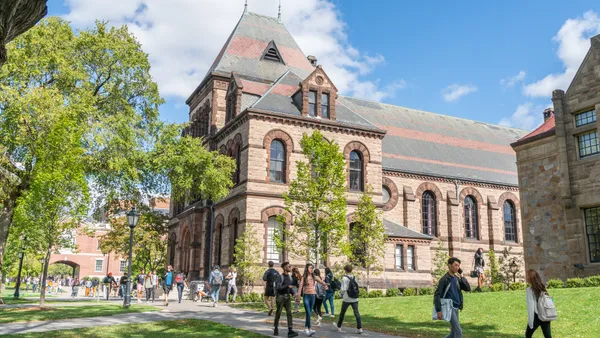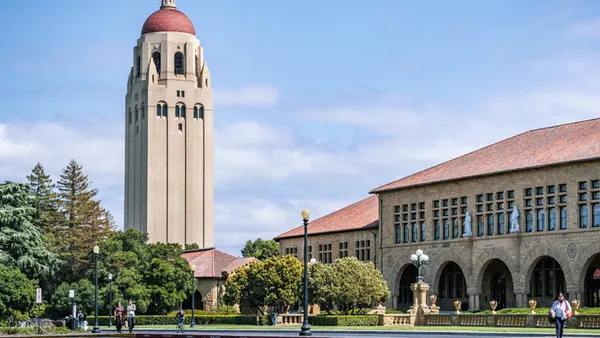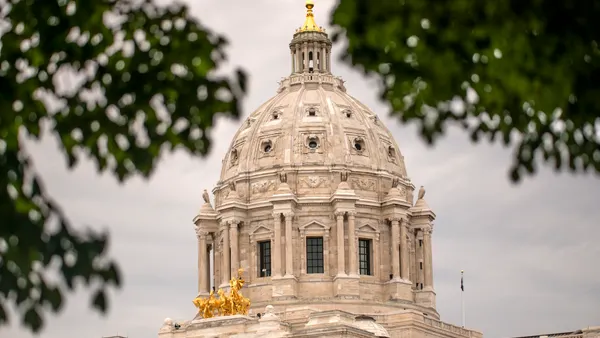Russia's invasion of Ukraine is reverberating in U.S. higher education and highlighting the sector's global ties.
Colleges' actions show the different roles institutions large and small fill during moments of global conflict. Higher ed institutions shape international relations, even as they are affected by them. Their faculty members attempt to help the public understand crises, and their leaders have a unique bully pulpit that allows them to discuss current events and values that are bigger than any one organization.
Here are a few of the notable ways colleges have reacted to the unfolding conflict.
MIT cuts ties with institute it helped start in Russia
The Massachusetts Institute of Technology on Friday told the Skolkovo Institute of Science and Technology, or Skoltech, that it is ending a long-standing relationship between the two research institutions. The step is a result of unacceptable military actions by Russia, MIT said in a statement posted to its Skoltech program website.
"We take it with deep regret because of our great respect for the Russian people and our profound appreciation for the contributions of the many extraordinary Russian colleagues we have worked with," the statement said.
MIT played a major role in Skoltech's founding in October 2011. The private nonprofit institution started working with the Skolkovo Foundation — which was backed by the Russian government under then-President Dmitry Medvedev — in 2010, according to a news release from the time. MIT has said it consulted with the U.S. Department of State on the effort.
The partnership sought to build Skoltech as a private graduate research university focusing on technology and entrepreneurship.
MIT helped develop the institute outside of Moscow, which graduated its first class of master's students in 2015. Skoltech's founding president, Edward Crawley, is an engineering professor at MIT who went on leave from the Massachusetts institution while he led the Russian startup for several years. Skoltech's first course on innovation operated remotely from MIT's campus, and an MIT campus advising team worked on the institute, among other connections.
MIT has also said the partnership presented opportunities for those based in the U.S., such as helping MIT reintroduce Russian language instruction after a nearly two-decade absence and giving MIT students the chance to travel to Moscow and St. Petersburg.
But the partnership has come with its difficulties. In 2019, the U.S. Department of Education cited MIT's relationship with Skoltech when it asked MIT for more information about its relationship with foreign governments and groups. The Ed Department's inquiry came amid a larger effort looking into university funding from foreign sources that often drew attention for its scrutiny of ties to China.
Still, MIT renewed its partnership with Skoltech that year. MIT had reviewed "the broader U.S.-Russia relationship," its associate provost for international activities, Richard Lester, said in a statement at the time. Working with others around the world committed to scientific inquiry and free exchange of ideas are MIT core values, Lester said.
Crawley told WGBH in 2020 that Skoltech was part of MIT's international policy.
"We won't build MIT campuses around the world, but we will help other universities develop along the lines of MIT," Crawley said, according to WGBH. "This is a manifestation of the foreign policy of MIT — to create like-minded institutions around the world."
MIT's president, L. Rafael Reif, wrote Sunday that severing the connection "comes with considerable sadness." MIT is working with its researchers who have been involved with Skoltech to transition postdocs to other projects and ensure students can complete their academic work.
It's not the first time Russia's actions have directly affected a U.S. college. Russia labeled Bard College an undesirable foreign nongovernmental organization last year, essentially banning it from the country. Bard had partnered with St. Petersburg State University to found a liberal arts college, Smolny College, about 25 years earlier.
Elsewhere, Biola University, a small Christian institution in California, has trained pastors in Ukraine for 15 years, according to the Whittier Daily News. Its Talbot School of Theology has an extension in Ukraine's capital Kyiv that normally includes about 30 students every semester. The Kyiv school moved to online class delivery a month ago, and students are either fleeing or waiting to see what is to come, university officials told the Daily News.
Voices call for protecting students in U.S. — or sanctioning them
A group of more than 500 college presidents, called the Presidents' Alliance on Higher Education and Immigration, asked the federal government to issue Temporary Protected Status and Special Student Relief for Ukrainians living or studying in the U.S. The moves would offer protection against deportation and give flexibility to Ukrainian international students, stopping them from potentially losing their visa status.
More than 1,700 Ukrainian international students were studying in the U.S. in 2020-21, according to data from the Open Doors report.
"International students from Ukraine will likely face significant obstacles and complexities in the coming weeks, months, and years; and uncertainty over their courses or ability to remain in the United States should not be one of those obstacles," Presidents' Alliance Executive Director Miriam Feldblum said in a statement.
On the other hand, Rep. Eric Swalwell, a California Democrat, suggested during a CNN interview that the U.S. should expel Russian students as part of actions against the country.
"I think closing their embassy in the United States, kicking every Russian student out of the United States, those should all be on the table, and Putin needs to know that every day that he is in Ukraine, there are more severe options that could come," Swalwell said, according to KRON.
The American Council on Education, higher ed's top lobbying group, does not believe students should be politicized, said Sarah Spreitzer, assistant vice president and chief of staff for government relations at the association. But it's a complicated matter because of sanctions being imposed by the U.S. and other countries that could make it hard for students from Russia to pay for college. Such measures include cutting major Russian banks out of the SWIFT financial system, which moves billions of dollars around the world every day.
ACE released a letter Monday on behalf of several higher ed groups asking the departments of State and Homeland Security to be flexible for Ukrainian students and scholars.
"We have heard from Ukrainian students who are concerned if their visas are about to expire, if their financial situation has changed," Spreitzer said.
Leaders release statements condemning Russia
Michigan State University's president cautioned against targeting individuals because of the conflict.
"In times of crises and conflict, it is important that we decouple individuals from the adverse actions of their home countries and governments," President Samuel Stanley said in a public letter. "Instead, we must continue to stand united in supporting one another with dignity, empathy and mutual respect."
Other college presidents and higher ed associations sought to portray the conflict in ways both sweeping and personal.
The Association of Public and Land-grant Universities called Russia's attack on Ukraine "an attack on democracy" and a threat to higher ed in Ukraine. The association condemned the invasion and "Russia's misinformation campaign to justify" its actions.
Syracuse University's chancellor, Kent Syverud, sounded similar notes, writing in a public letter that the invasion may be "a very significant moment that will have a ripple effect throughout our community." The university has students and employees from Ukraine and Russia who have loved ones who could be in harm's way, he wrote.
"Syracuse University also has many students, faculty and staff that are active-duty military or in the Guard or Reserves," he wrote. "They, and their families, may have their lives changed dramatically on short notice due to the response to this conflict. The economic sanctions and measures being implemented and contemplated between nations could have a significant effect on our university and our people in an environment where supply chains and international travel are already strained."
MIT's president, Reif, put the current conflict — and the long history behind it — in personal terms. His family fled the western Ukraine-Moldova region as refugees just before World War II, he wrote. His father escaped first, followed by his mother and oldest brother, who was a year old at the time.
"The circumstances then were different: My parents were running from pervasive antisemitism and the rise of Hitler," he wrote. "In their small town, no one they left behind survived. But their experience is a reminder of the brutal human consequences of state-sponsored aggression and violence."
In a notably simple statement, the University of Scranton, in Pennsylvania, lit its gateway sign with the Ukrainian flag.
Students and faculty protest invasion at campuses across country
College students and faculty members have sought to protest the invasion in public forums, with personal stories spilling out.
Roughly 100 people attended a Stand with Ukraine rally Saturday at the University of Michigan, MLive reported. More than 100 took part in an informal demonstration in support of Ukraine at Princeton University, according to The Daily Princetonian. The Ukrainian Society at Pennsylvania State University held an impromptu rally last week, WNEP reported.
A Vanderbilt University voice performance student from Ukraine who attended a Tennessee rally told WTVF she worries about her family's safety.
"Today I woke up and I saw a lot of videos of my hometown burning, there were a lot of fires in my hometown and a lot of places that were meaningful for me and I don't know what it's going to be like when I come back," she told the station.
Faculty members publicly discuss the situation
College faculty members are working to translate the conflict and the new age it may signal for their students and the general public.
The Morning Sentinel of Waterville, Maine, profiled a government professor at Colby College who has talked with students in the classroom about the invasion. The biggest challenge is that no similar events have taken place in recent memory, so while students are concerned, they don't have a frame of reference, he told the newspaper.
Professors talking about the conflict in the media include the director of Russian studies at Muhlenberg College in Pennsylvania, a Russian language professor at the University of Montana, a history professor at Bethel University, in Minnesota, a political science professor at the University of Toledo, in Ohio, a political science professor at Rice University, in Texas, and a professor at Marist College, in New York, who taught in Moscow when Russia annexed Crimea in 2014.
The director of a cybersecurity master's program at Utica University in New York discussed the potential for Russian misinformation campaigns at home, as did a University of Texas researcher.



